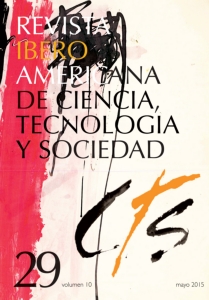Estudos CTS no desenvolvimento do sistema de informação de incidentes e acidentes ambientais no setor industrial
DOI:
https://doi.org/10.52712/issn.1850-0013-520Keywords:
STS studies, breakdowns, incidents, environmental accidentsAbstract
Industrial companies should implement a process to identify significant environmental aspects related to their own activities, products or services that should be taken care of as priorities. In addition, these organizations should determine their current situation regarding the environment, by reviewing the information obtained through research works on events and accidents associated with meaningful environmental aspects, as well as its consequences for the environment and business management. With the aim of monitoring the productive processes with the highest impact of accidents, and of adapting the inner procedure for the management of reports on incidents, events, and breakdowns of the mining-metallurgical company Ernesto Che Guevara (ECG), this paper intends to present the socio-economic impact brought about by the development of an information system for the comprehensive management of environmental incidents and accidents within the industry sector, capable of ensuring an improvement in the process led by the specialists from the industrial safety and environment group of the aforementioned company.
Downloads
References
BESTRATEN, M., GIL, A. y PIQUÉ, T. (2010): NTP 592: La gestión integral de los accidentes de trabajo (I): tratamiento documental e investigación de accidentes.
CABRERA, G. (2010): Gestión ambiental universitaria, integración y prevención de desastres naturales en el Caribe, La Habana.
CITMA (2010): “Leyes, normas y decretos dictados por el CITMA“. Disponible en: http://www.medioambiente.cu/legislacionambiental/leyes.htm.
CITMA y CICA (2001): Guías para la realización de las solicitudes de licencia ambiental y los estudios de impacto ambiental.
CONESA, V. (2000): Guía metodológica para la evaluación del impacto ambiental, Mundi-Presa Libros.
CUBA (1994): Ley Nº 75 de la Defensa Nacional.
CUBA (1995): Ley Nº 76. Ley de Minas.
CUBA (1997): Decreto Nº 222. Reglamento de Ley de minas.
CUBA (1997): Ley Nº 81 del Medio Ambiente.
CUELLAR, J. (2011): Sistemas de gestión ambiental ISO 14001.
DHI (2013): Sistema de Información Geográfico GEOFES. Disponible en: http://www.dhi.es/MIKECUSTOMISEDbyDHI/GeoFES.aspx.
GUARDADO, R. (2009): “Propuesta de indicadores ambientales sectoriales para el territorio de Moa”. Disponible en: http://w3.cetem.gov.br/cytedxiii/Downloads/ IndicadoresSostenibilidad_Espanhol_Portugues/IndicadoresSostenibilidad_Capitulos /Capitulo_III/19_CUBA_RafaelGuardado_OlgaVallejo.pdf.
GUERRERO, S. (2009): Manual de gestión integral y de procedimientos de una empresa dedicada al sector servicios, Barcelona.
ISOTOOLS (2013): “¿Qué es ISOTOOLS?”. Disponible en: http://www.isotools.org/ que-es-isotools.cfm.
ISOTOOLS (2013): “¿Por qué ISOTOOLS?”. Disponible en: http://www.isotools.org/ por-que-isotools.cfm.
LUGO, J. y PORRO, L. (2011): “Introducción al análisis de riesgos ambientales”. Disponible en: http://www.bvsde.paho.org/CDGDWQ/Biblioteca/Manuales_Guias_ LibrosDW/PNUDDocumentos/Introducci%C3%B3n%20al%20an%C3%A1lisis%20de %20riesgos%20ambientales.pdf.
REYNALDO, C. L. (2011): “Indicadores económico-contables para optimizar la explotación de yacimientos lateríticos”. Disponible en: http://www.anec.cu/docs/ Premio%20Anual%20de%20Econom%C3%ADa%20Junio%202011-2.pdf.
RODRÍGUEZ, J. y PABÓN, L. (2012): Sistemas de Gestión Integrados en Ambiente, Seguridad y Salud Ocupacional.
SÁNCHEZ, R. (2010): Procedimiento para reporte de investigación de incidentes de trabajo y ambientales.
Downloads
Published
How to Cite
Issue
Section
License
Copyright (c) 2023 CC Attribution 4.0

This work is licensed under a Creative Commons Attribution 4.0 International License.
All CTS's issues and academic articles are under a CC-BY license.
Since 2007, CTS has provided open and free access to all its contents, including the complete archive of its quarterly edition and the different products presented in its electronic platform. This decision is based on the belief that offering free access to published materials helps to build a greater and better exchange of knowledge.
In turn, for the quarterly edition, CTS allows institutional and thematic repositories, as well as personal web pages, to self-archive articles in their post-print or editorial version, immediately after the publication of the final version of each issue and under the condition that a link to the original source will be incorporated into the self-archive.











